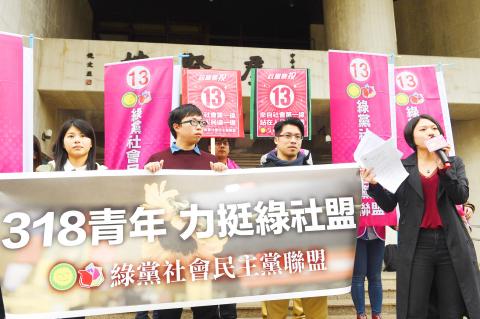Sunflower movement leader Dennis Wei (魏揚) yesterday endorsed the Green Party-Social Democratic Party Alliance, in the party’s latest move to compete with the New Power Party (NPP) to serve as the movement’s standard bearer in next Saturday’s elections.
The student movement in 2014 saw the Legislative Yuan’s main chamber occupied for three weeks as part of protests against the government’s handling of a trade in services agreement with China.
“I originally would have supported the Green Party because it is close to my own political convictions — caring for the land, the environment and workers’ rights. I think it can be fairly said that the Alliance stresses these issues, while the NPP focuses on legislative reform and the Taiwan Solidarity Union on national identity,” Wei said.

Photo: George Tsorng, Taipei Times
“I think all of them are great, but I hope that the party which concentrates on land and labor rights can make it into the legislature,” he said, adding that while the Democratic Progressive Party’s (DPP) nomination of civil activists was commendable, voting for small parties was unlikely to cost the party a substantial number of seats.
The Alliance and NPP emerged following a split among activists seeking to form a political party following the Sunflower movement, but integration negotiations last year failed over relations with the DPP.
The NPP has successfully recruited several prominent movement members, with leaders Chen Wei-ting (陳為廷) and Wu Cheng (吳崢) both heading the campaigns of NPP legislative candidates.
Wei said his own work as a campaign staffer for NPP legislative candidate Chiu Hsien-chih (邱顯智) was a combination of coincidence and personal ties.
“I have helped Chiu because he is in Hsinchu and I also happen to be there. He has also helped defend me in court,” Wei said.
He and other student representatives declined to directly criticize the NPP, with Wei saying that he hoped the Alliance and the NPP would be able to cooperate if they both win legislative seats.
Separately yesterday, Lin Fei-fan (林飛帆), another Sunflower movement leader, said he supported both parties, adding that both of their memberships included “important partners” from the movement.
“While the issues they focus on are slightly different, that is just because there are a huge number of social movement areas and topics. I feel that while they only have differences in electoral strategy — their objectives and ideas are practically identical,” he said.

A preclearance service to facilitate entry for people traveling to select airports in Japan would be available from Thursday next week to Feb. 25 at Taiwan Taoyuan International Airport, Taoyuan International Airport Corp (TIAC) said on Tuesday. The service was first made available to Taiwanese travelers throughout the winter vacation of 2024 and during the Lunar New Year holiday. In addition to flights to the Japanese cities of Hakodate, Asahikawa, Akita, Sendai, Niigata, Okayama, Takamatsu, Kumamoto and Kagoshima, the service would be available to travelers to Kobe and Oita. The service can be accessed by passengers of 15 flight routes operated by

Chinese spouse and influencer Guan Guan’s (關關) residency permit has been revoked for repeatedly posting pro-China videos that threaten national security, the National Immigration Agency confirmed today. Guan Guan has said many controversial statements in her videos posted to Douyin (抖音), including “the red flag will soon be painted all over Taiwan” and “Taiwan is an inseparable part of China,” and expressing hope for expedited reunification. The agency last year received multiple reports alleging that Guan Guan had advocated for armed reunification. After verifying the reports, the agency last month issued a notice requiring her to appear and explain her actions. Guan

GIVE AND TAKE: Blood demand continues to rise each year, while fewer young donors are available due to the nation’s falling birthrate, a doctor said Blood donors can redeem points earned from donations to obtain limited edition Formosan black bear travel mugs, the Kaohsiung Blood Center said yesterday, as it announced a goal of stocking 20,000 units of blood prior to the Lunar New Year. The last month of the lunar year is National Blood Donation Month, when local centers seek to stockpile blood for use during the Lunar New Year holiday. The blood demand in southern Taiwan — including Tainan and Kaohsiung, as well as Chiayi, Pingtung, Penghu and Taitung counties — is about 2,000 units per day, the center said. The donation campaign aims to boost

The Central Weather Administration (CWA) said a magnitude 4.9 earthquake that struck off the coast of eastern Taiwan yesterday was an independent event and part of a stress-adjustment process. The earthquake occurred at 4:47pm, with its epicenter at sea about 45.4km south of Yilan County Hall at a depth of 5.9km, the CWA said. The quake's intensity, which gauges the actual effects of a temblor, was highest in several townships in Yilan and neighboring Hualien County, where it measured 4 on Taiwan's seven-tier intensity scale, the CWA said. Lin Po-yu (林柏佑), a division chief at the CWA's Seismological Center, told a news conference